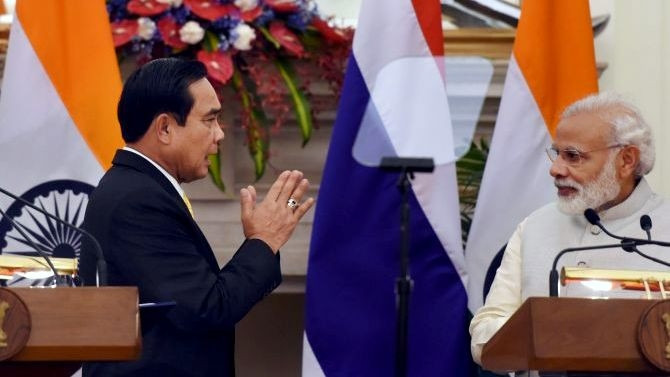The visit contributed to demonstrating that India continues to promote its "Act East" policy, a strategic policy that has been welcomed by ASEAN and helps New Delhi expand its influence in Southeast Asia.
A series of fields for bilateral co-operation between India and Thailand were unanimously passed by Indian PM Narendra Modi and his Thai counterpart Prayut Chan-o-cha to promote co-operative relations between the two in the near future, including in the economy, trade and defence.
On the economy and trade, the two PMs agreed to accelerate negotiations to sign 12 co-operation agreements in various fields, such as trade, investment, ICT and electronics. The two leaders also agreed to give priority to the completion of a highway running through India, Myanmar and Thailand - a strategic road linking Southeast Asia to northeastern India.
On defence and security, the two sides agreed to strengthen co-operation especially in maritime fields, including co-operation against piracy, ensuring sea lane security, and maintaining peace, security and maritime security in the Indian Ocean. Accordingly, joint exercises, anti-piracy co-operation, enhanced naval patrols and defence manufacturing are among the top priority areas.
In addition, the two parties also agreed to co-operate in areas of the two countries' potential and needs, such as tourism, cyber security and counterterrorism. According to PM Modi, promoting a closer partnership in the field of defence and maritime co-operation meets bilateral interests and responds to regional objectives that both countries share.
To open doors for co-operation with ASEAN, India has increased ties with Thailand, a country located in the heart of Southeast Asia. The ties are especially important as the Modi government shifted from the "Look East" to the "Act East" policy when coming to power in 2014, aiming to expand economic co-operation with Southeast Asian countries.
Strengthening relations with ASEAN was the primary focus in the "Look East" policy enacted in 1991. Since then, relations between ASEAN and India have grown rapidly, from sectoral dialogue partnership in 1992, to full dialogue partnership in 1995 and strategic partnership in 2012. In recent years, ASEAN-India co-operation has seen positive progress, as the two sides have established partnerships throughout all fields of politics, economy, culture and society.
PM Modi affirmed that New Delhi considers ASEAN the centre of its “Look East” strategy, expressing his wish to strengthen co-operation with ASEAN in all three pillars, especially with the establishment of the ASEAN Community at the end of 2015.
ASEAN also appreciated India's support for the ASEAN Community building, as well as for strengthening connections and extended support for small and medium enterprises, especially in helping to establish English and IT training centres in Cambodia, Laos, Myanmar and Vietnam through the ASEAN-India Fund, ASEAN-India Green Fund and ASEAN-India Science & Technology Development Fund. The ASEAN-India Plan of Action for the 2016-2020 period is expected to deepen the strategic partnership between the two sides.
Indian Ambassador to ASEAN Suresh K. Reddy emphasised that India is facilitating strong co-operation with ASEAN countries in the economy and trade, and especially in infrastructure investment.
ASEAN is currently India’s fourth largest trade partner with an average increase of 22% per year over the last decade. The ASEAN Economic Community (AEC)’s official formation in December 2015 helped ASEAN become the third largest economy in Asia and seventh in the world, with a market of 622 million people, opening up opportunities and creating favourable conditions for Indian businesses to do business in Southeast Asia. Meanwhile, India is not only a huge market with over 1.2 billion people, but also a centre of global foreign direct investment attraction.
The specific co-operation results during the visit to India by Thai PM Prayut Chan-o-cha showed an enhanced determination to ‘act east’ from the Modi government to promote balance, peace and stability in the region. Through the “Act East" policy, New Delhi continues to reinforce trust to balance relations not only in Southeast Asia, but also across Asia Pacific.
















